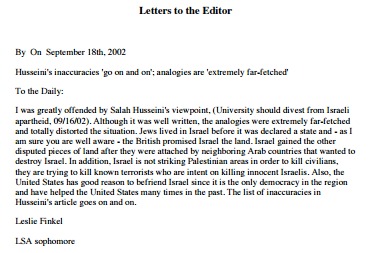Case Study: Divestment from Israel
A year after full divestment from South Africa occurred, another issue gripped campus. In March 1989, the Muslim Students Association (MSA) built a Palestinian shanty on the heavily traveled Diag. Like the shanties built for the anti-apartheid movement in March 1985, 1986, and 1987, MSA constructed the shanty to “symbolize the struggle and oppression of the Palestinian people.” The shanty was torn down in what the MSA viewed as an attack to stifle awareness and free speech. Like the attacks on the South African shanty, the actions signaled unrest and disagreement on campus.
This movement did not go dormant. In 2002, The Michigan Daily received several letters to the editor supporting both sides of the struggle. A particularly strongly worded letter was published on September 18, 2002 in response to a letter urging divestment from the Israeli apartheid published two days prior. In the response, the LSA sophomore argued that the autonomy that Israeli deserves through its own struggles and efforts to defend democracy in the Middle East. The language used in the argument demonstrated how polarized the issue was fifteen years after the Palestinian shanty was destroyed. Unlike the anti-apartheid divestment, the sides of the Israeli divestment were not on the same side with varying degrees. The issue brings about much more argument about the actions of both governments and peoples, which was not seen with the South African divestment where no one openly supported the apartheid government.
In 2002, Fadi Kiblaw the president of Arab-American Anti-Discrimination Committee, Co-Chair of the Minority Affairs Commission and Co-Founder of Students Allied for Freedom and Equality (SAFE) wrote a piece for The Michigan Daily that directly related the Israeli-Palestinian conflict with the South African Apartheid Regime, “Kasrils and Tutu, as well as Nelson Mandela and countless other South Africans, have all noted the uncanny resemblance of Israel's occupation of Palestine to South Africa's Apartheid.” The article continues to draw comparisons between Palestine and 1980s South Africa. Kiblaw finishes with a plea for the student body, “It is up to you to continue the U's traditions through enforcing our fundamental values of freedom and equality in our financial portfolio, and urging our regents to divest from Israeli apartheid.”
In 2005, the 40th anniversary of the Vietnam War Teach-In that took place at the University featured the Israeli-Palestinian conflict. The University refused to fund the event because Mary Sue Coleman, then the University president, said that the University does not take political statements. The Michigan Daily notes in a March 2005 article, “Hayden, other activists convene for teach-in,” that Coleman had opposed the divestment attempt the previous year.
SAFE has evolved into a key organization for the Israeli divestment movement, known as #UMDIVEST in Winter 2014. The movement escalated to a vote by the Central Student Government (CSG) to divest from companies identified as violating Palestinian human rights. The movement had 36 student organizations sign their support for the cause. At the March 19, 2014 CSG meeting, 300 students in support of the divestment appeared. There were students who opposed the divestment but significantly less made their voices heard. Ultimately, there was a vote permanently table the vote 21-15 with one abstention. In response, the supporters of SAFE staged a weeklong sit-in to try and encourage a vote.
The issue was not resolved and SAFE brought the issue back to campus in the 2014-2015 academic year. The SAFE website announced their return in November 2014 stating they were “standing by our moral obligations as university students, SAFE officially announces the launch of its #UMDivest campaign for the 2014-15 school year.” Utilizing social media to spread support of their cause, the SAFE Facebook page had 799 “likes” as of April 2015.
On March 30th, 2015 SAFE dropped a banner from a window facing the Diag in Mason Hall that read “The Deaths of These Children” with a list of names who allegedly died as result of the Israeli-Palestinian conflict. The bottom of the banner read “Sponsored by” and featured the names and logos of companies that SAFE requested the University divest from for their violation of human rights in Palestine. 2015 saw the creation of Jewish Voices for Peace, a student group focusing on the education of alleged human rights violations occurring in Palestine, and Wolverines for Peace, a Jewish-based organization whose Facebook page stated in April 2015 as “a movement to promote long-term peace between Israel and the Palestinians and mutual understanding on campus and in the region.” CSG voted once more on a divestment resolution on March 31st, 2015, which failed to pass with 15 votes in favor and 25 opposed. At the end of winter term 2015, the issue does not seemed resolved.
Sources for this page:
The Michigan Daily, September 2, 2002
The Michigan Daily, September 18, 2002
The Michigan Daily, March 24, 2005
The Michigan Daily, November 20, 2014
The Michigan Daily, March 25, 2014
The Michigan Daily, March 31, 2015

